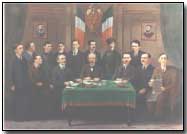The British Nationality Act 1948 was an Act of the Parliament of the United Kingdom that created the status of "Citizen of the United Kingdom and Colonies" (CUKC) as the national citizenship of the United Kingdom and its colonies.
The Act, which came into effect on 1 January 1949, was passed in consequence of the 1947 Commonwealth
conference, which had agreed that each of the Commonwealth member
states would legislate for its own citizenship, distinct from the shared
status of "Commonwealth citizen" (formerly known as "British subject").
Similar legislation was also passed in most of the other Commonwealth
countries.
The Act formed the basis of the United Kingdom's nationality law until the British Nationality Act 1981
came into force in 1983. However, the concept of a common Commonwealth
citizenship had already been progressively eroded from 1962 onwards by
British legislation targeted against non-White Commonwealth immigrants.
Broadly speaking, nationals of the United Kingdom, the Dominions, and the various British colonies had always shared a common citizenship status of "British subject". However, in 1946 the Canadian parliament passed the Canadian Citizenship Act,
which established a separate Canadian citizenship. In response, a
Commonwealth conference met in London in 1947, where it was agreed that
each of the Commonwealth member states would be free to legislate for
its own citizenship, while still retaining elements of a common
Commonwealth citizenship. The resultant legislation passed by the United
Kingdom for itself and its colonies was the British Nationality Act 1948. Legislation passed in the other Commonwealth countries included Australia's Nationality and Citizenship Act 1948, New Zealand's British Nationality and New Zealand Citizenship Act, 1948, and Southern Rhodesia's Southern Rhodesian Citizenship and British Nationality Act, 1949.
The Act created the new status of "citizen of the United Kingdom and Colonies" (CUKC) for people born or naturalised
in either the United Kingdom or one of its colonies. Provision was also
made in certain circumstances for citizenship to be acquired by descent
from a CUKC, or by registration.
Between 1962 and 1971, as a result of fears about increasing immigration by Commonwealth citizens from Asia and Africa, the United Kingdom gradually tightened controls on immigration by British subjects from other parts of the Commonwealth. The Immigration Act 1971 introduced the concept of patriality, by which only British subjects with sufficiently strong links to the British Islands (i.e. the United Kingdom, the Channel Islands and the Isle of Man) had right of abode, the right to live and work in the United Kingdom and Islands.
Most of the 1948 Act was replaced by the British Nationality Act 1981 with effect from 1 January 1983.
The only significant provision of the Act to survive today is section 3, which concerns the extra-territorial jurisdiction
of the criminal courts over crimes committed by British subjects
overseas. Generally, British criminal law does not apply to things done
overseas, but there are some exceptions for acts done abroad by British
subjects, such as murder. Section 3 restricted the scope of this
jurisdiction to CUKCs (except in respect of crimes that would be against
UK law even if committed by aliens). This was necessary so that, for
example, a Canadian citizen who committed murder in Canada could not be
prosecuted for it in a British court instead of in Canada.
As modified by section 51 of the British Nationality Act 1981, section 3 now restricts this jurisdiction to British citizens, British Overseas Territories citizens, British Overseas citizens and British Nationals (Overseas).
(Note, however, that section 3 is subject to any subsequent legislation to different effect, such as section 72 of the Sexual Offences Act 2003 (as amended).)
Also, in spite of the fact that most of this Act has been repealed by
the British Nationality Act 1981, the acquisition of new categories of
British Nationality created by the British Nationality Act 1981 is often
made dependent on one's nationality status prior to the effective date
of the British Nationality Act 1981. This therefore means that many of
the original provisions of British Nationality Act 1948 are still
relevant today.

No comments:
Post a Comment